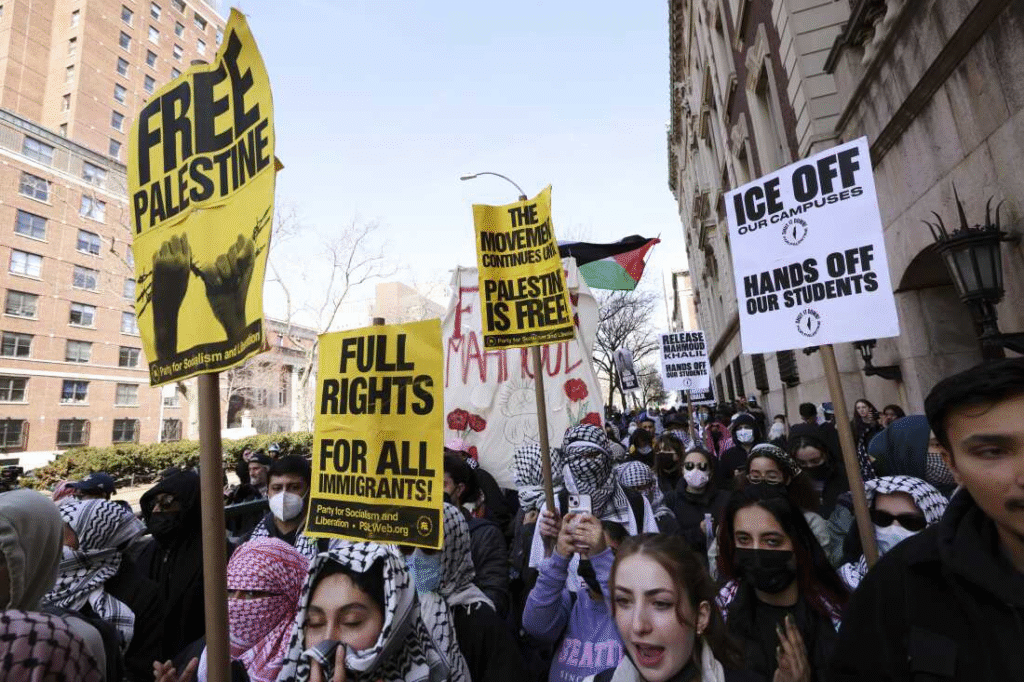The Trump administration has formally accused Columbia University of violating federal civil rights law by allegedly failing to adequately protect Jewish students from ongoing discrimination and harassment. This accusation marks one of the most forceful actions yet in the administration’s broader campaign to address what it calls a rise in antisemitism on college campuses across the United States.
The Trump Department of Health and Human Services Office for Civil Rights concluded that Columbia University has acted with “deliberate indifference” toward the harassment faced by Jewish students since October 2023. The agency’s findings were part of an extensive investigation that took place in the wake of the October 7, 2023 Hamas attack on Israel and the ensuing Israeli military response in Gaza—a period during which tensions and activism surged on university campuses nationwide.
The Trump The administration’s complaint centers on violations of Title VI of the Civil Rights Act of 1964, which prohibits discrimination based on race, color, or national origin in any program or activity receiving federal financial assistance. Federal officials allege that Columbia University failed to respond effectively to numerous complaints of antisemitic harassment and failed to provide a safe and supportive educational environment for Jewish students.
The Trump These findings are the result of work done by the Joint Task Force to Combat Anti-Semitism, which was created following an executive order issued by President Donald Trump in February. The task force’s mandate is to investigate and take action against rising instances of antisemitism in educational institutions and other federally funded entities.
The Trump In a statement responding to the allegations, a Columbia University spokesperson acknowledged the government’s findings as part of an ongoing dialogue between the institution and federal authorities. “We understand this finding is part of our ongoing dialogue with the government,” the spokesperson said in a statement to CNN.
The Trump Despite these assurances, the administration’s report paints a troubling picture of life on Columbia’s campus for Jewish students over the past year and a half. Anthony Archeval, acting director of the HHS Office for Civil Rights, emphasized the severity of the situation. “We urge Columbia University to partner with us to reach an agreement that brings about meaningful reforms to truly safeguard Jewish students.”
Among the specific criticisms outlined by the administration are allegations that Columbia failed to investigate reports of antisemitic vandalism in classrooms, did not adequately enforce rules governing on-campus protests, and fell short in applying its own policies when addressing complaints from Jewish students. Furthermore, federal officials claim that effective measures to counter antisemitism were not implemented until the summer of 2023—months after many of the incidents reportedly began.

Columbia is not the only institution facing pressure from the Trump administration. Elite universities across the country have come under increasing scrutiny, with federal officials warning that continued non-compliance with policy demands could result in the loss of federal funding. This growing tension reflects a broader political and cultural battle playing out on college campuses, where debates over free speech, academic freedom, and the Israeli-Palestinian conflict have grown increasingly contentious.
The wave of pro-Palestinian protests that erupted last spring at Columbia played a pivotal role in drawing national attention to the issue. Those protests, which included encampments and demonstrations, inspired similar movements at colleges and universities across the U.S. In many cases, the protests escalated to the point of mass arrests and disciplinary action, with university administrators caught between pressure from the federal government and demands from student activists.
In March, the Trump administration took a dramatic step by announcing the cancellation of $400 million in grants and contracts to Columbia University. This unprecedented move underscored the seriousness of the administration’s position and served as a warning to other institutions.
Alongside the funding withdrawal, the administration issued a set of policy demands aimed at reforming Columbia’s approach to campus safety and accountability. These included implementing stricter regulations on protests, banning face coverings during demonstrations, establishing clear accountability for student groups, and conducting a review of Columbia’s Middle East studies programs for potential bias or inflammatory content.
In response, Columbia University introduced a series of new policies designed to comply with federal expectations. Among the changes were new restrictions on demonstrations, updated codes of conduct, and efforts to strengthen reporting mechanisms for incidents of discrimination and harassment. However, these efforts have done little to quell criticism from the administration or from some Jewish advocacy groups that argue more substantial changes are still needed.
Other elite institutions have also faced consequences for resisting federal pressure. In a notable example, the Trump administration announced on Thursday that it had revoked Harvard University’s ability to enroll international students. The decision was justified with harsh rhetoric, accusing Harvard’s leadership of turning the university into a “hotbed of anti-American, anti-Semitic, pro-terrorist agitators.” The administration’s statement reflected its increasingly aggressive stance toward what it views as ideological bias and administrative failure at some of the country’s most prestigious schools.
This campaign against perceived campus antisemitism comes amid a politically charged climate where higher education institutions are under intense scrutiny from multiple directions. While universities have traditionally prided themselves on being spaces for open dialogue and academic freedom, they now face the challenge of navigating complex geopolitical issues, student activism.
